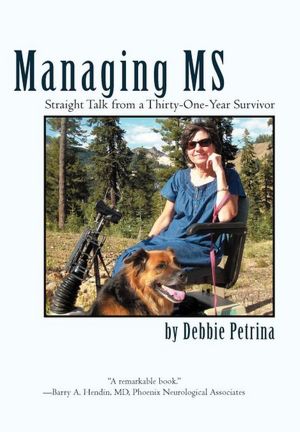“The $1 Million Question: What to Do?”
July 23, 2012
Stress has been analyzed for years to determine if stress affects the body. I roll my eyes at these analyses. Personal experience with MS and anyone with MS I have ever talked to knows stress has a direct impact on us in the short or long term. Or any other chronic disease for that matter.
It doesn’t take a rocket scientist for us to also know that ALL types of stress—physical, mental and emotional–has an impact on MS. While MS research hones in on triggers that bring on MS—viruses, vitamin D deficiency, genetic factors for instance—it seems that the final kicker to bring out the initial MS attack is often the result of an extremely stressful event such as:
*an accident, injury, or sickness
*a horrendous altering personal situation (for example, death, divorce, new baby, job loss, etc.)
*long-term chronic fatigue from being overworked (such as simultaneouslyworking, raising a family, and running a household while neglecting one’s health…)
And these same long-term chronic stresses can be the precursor for more flare-ups or exacerbations as life goes on. These are serious events that require serious attention.
So let’s forget the “if” in the stress factor and focus on the “what to do about it” part, because that’s what really matters.
The goal? We want to prevent it, minimize it, and/or resolve stress. The buzz-words used today for this is stress management.
Unfortunately, stress is like anything else in today’s society. It comes in countless varieties—type, intensity, duration, onset, frequency—and there are always more than one to deal with. So for starters, one has to sort out what the stresses are and then what’s causing them. Then we can proceed with prioritizing them and finally managing them. It sounds complicated because many times it is. But going through a process to handle them lessens the overwhelming, impossible feeling they give us and helps us focus on the important ones first.
Let’s start with the first bullet above. Obviously, if we have an accident, injury or sickness, we take steps to get cured or better. During this process our symptoms are in the crazy zone from our defunct immune system, medications, fever, etc. So while we are recovering from our physical problem, we have to address the other associated stresses (pain, medication side effects, fatigue, undone domestic chores…).
It’s hard to be patient during this relapse, but it helps if you try to stay calm and focused on the fact that: when the injury/sickness is better, the symptoms will be better. The state of mind and a positive attitude is a powerful force on our well-being and healing process.
Furthermore, it’s important to takes measures to prevent these things from happening in the first place. For example, if you have a mobility problem from fatigue or balance issues, use walking aids to prevent falling and muscle strain; if someone has a cold or flu, don’t go near them…
In the other situations above, when things happen that are out of our control (death, job loss, overworked) stress can be minimized/resolved and here’s how:
- First and foremost, take care of yourself and your health. Ensure that you eat and sleep. Self-control and mental/emotional effectiveness is enhanced while resistance to getting sick is maintained. Let’s face it, we know how we (re)act when we are tired or hungry. I freak out when I am tired and my husband is a beast when he is hungry; so I head for the bed and he heads for the frig.
- Seek help and support from others to lessen the burden. Professional counseling, peers and support groups are invaluable for sharing, caring, problem-solving, finding connections and venting in a “safe” environment. Reach out and ask for help from friends, family, neighbors, your religious association, etc. for physical, financial, domestic issues. If you are concerned about humbling yourself or feeling ashamed, don’t be. You would do it for them; let them help you.
- Learn to say “no” to anything that would overtax you, no matter what the circumstance. List your priorities, and review it frequently.
- Figure out ways to change your lifestyle. Again, rely on others to help. I was a perfectionist, an independent person, and a constant doer. Therapy and unrelenting fatigue transformed me into a non-perfectionist (so what if the house didn’t get cleaned?), a more dependent person (I let others clean, cook and wash for me), and less of a doer (I made the time to rest in a quiet room at various intervals).
In contrast, short-term stress will cause a worsening of symptoms from an hour up to a day or two. The good news is however, that short-term stress can be remedied quickly and easily when identified.
This can include anything like lack of sleep, an argument, heat or allergies. Having an argument with my husband will frustrate me, causing me to drop things more and throw my legs into spasms. So I take a time-out and find ways to de-stress such as swim/exercise, take a walk around the block, read, phone a friend, read, shop on the internet, deep breathing….whatever works to calm down. Then I am better able to think and cope.
If I’m hot, I’ll cool myself down with ice water or ice packs. Showers and baths are definitely rejuvenating. When I start a new drug, I may have side effects; if the effects don’t reduce in a week or two, I might decide to stop them if the side effects are worse than the benefits I am receiving from them. If the monthly menses are causing too much havoc, it’s time to call the gynecologist. I personally was on a birth control pill for hormone management for years to help me with this problem.
In the past, I have talked to my physicians about different medications to try to help with the stresses/effects of things like depression, anxiety, or insomnia. These are very common issues with MS, and there is nothing wrong with taking something to help us cope. I have successfully used antidepressants, anxiety pills and sleeping aids intermittently over the years.
There is a lot of merit in new alternative therapies such a deep breathing, yoga, pilates, and tai chi to name a few. I have tried them all, and they provide great benefit for relaxation as well as aiding problems associated with symptoms such as weakness, balance, endurance and fatigue. These can be learned from videos, online resources, and local clubs/associations/ MS chapter programs.
There are ways these techniques can be incorporated into daily activities. For instance, deep breathing can be done while showering. Standing on one leg while doing dishes can help with balance.
Whatever it is that can help—medications, alternative therapies, therapy/self help groups etc.—it never hurts to try it out and see if it works for you. As with anything, what works for one person may not work for someone else. And I always say—“Two heads are better than one” in figuring out a problem or solution.
If there is no clear-cut problem or solution, find a peer to talk to. It’s comforting to just unload stresses, secrets and complaints to get it off your chest. There is no one better than a peer or a good, loyal friend to “dump” on. They would do it for you as you would do it for them. And, yes–“misery loves company.”
Finally, it’s okay to just go ahead and vent! Go into a room alone, close the door, and let it out. Scream, yell, cry, swear, or throw pillows. Most of the time I do very well, but then that moment arrives. I give myself a break to let go and lose control. Like a pressure cooker. I earned that right, and so have you. It doesn’t solve anything, but it sure feels good.
P.S. You can always take a stress management class. I never have, but it’s worth a try!


